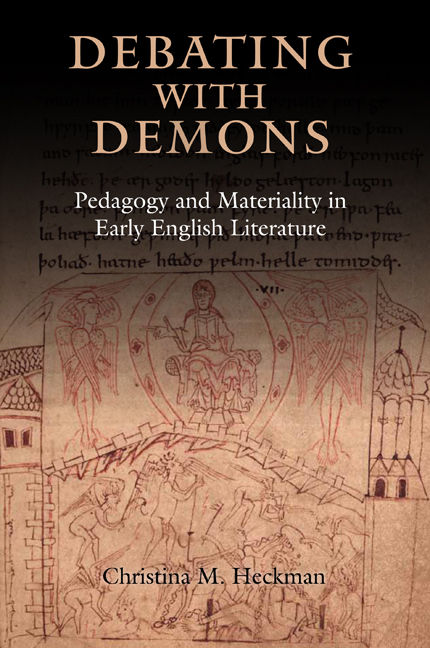Book contents
- Frotmatter
- Dedication
- Contents
- Introduction: The Devil’s Secret Chamber
- Part I Foundations
- 1 Spirituo-Materiality in the Early Middle Ages
- 2 The Artes Liberales in the Early Middle Ages
- 3 The Devil Within: Perils of Pedagogy in the Monastic School
- Part II The Demonic Magister in Early English Poetry
- 4 The Origin of the Teaching Demon: Lucifer as Magister
- 5 Demonic Teaching and the Fall in the Old English Genesis
- 6 Demonic Teaching and Saintly Discretio in Cynewulf’s Juliana
- 7 Inventing Materia: The True Cross and Saintly Disputation in Cynewulf’s Elene
- Conclusion: The Mysteries of Pedagogy
- Bibliography
- Index
- Acknowledgments
- Anglo-Saxon Studies
4 - The Origin of the Teaching Demon: Lucifer as Magister
Published online by Cambridge University Press: 06 October 2020
- Frotmatter
- Dedication
- Contents
- Introduction: The Devil’s Secret Chamber
- Part I Foundations
- 1 Spirituo-Materiality in the Early Middle Ages
- 2 The Artes Liberales in the Early Middle Ages
- 3 The Devil Within: Perils of Pedagogy in the Monastic School
- Part II The Demonic Magister in Early English Poetry
- 4 The Origin of the Teaching Demon: Lucifer as Magister
- 5 Demonic Teaching and the Fall in the Old English Genesis
- 6 Demonic Teaching and Saintly Discretio in Cynewulf’s Juliana
- 7 Inventing Materia: The True Cross and Saintly Disputation in Cynewulf’s Elene
- Conclusion: The Mysteries of Pedagogy
- Bibliography
- Index
- Acknowledgments
- Anglo-Saxon Studies
Summary
While monastic school-texts used in the study of the liberal arts articulate anxieties about demonic teaching in the monastery, Old English verse demonstrates how demonic pedagogy is deployed in poetic dialogue. This chapter opens Part II, which concentrates on representations of demonic teachers in early English poems about the Fall of the Angels, the Fall of Adam and Eve, and the lives of the saints. By examining the origin story of Satan and his demons, Christ and Satan and the Old English Genesis poems, preserved in Bodleian Library, MS Junius 11, explore the spirituo-material and onto-epistemological nature of demonic teaching in early English poetry as well as the implications of such teaching for the material transformation of both bodies and places. Such transformation first occurs in hell, to which the fallen angels and their magister, Lucifer, are condemned.
In poetic scenes of pedagogy, like those in Christ and Satan and Genesis, demonic teachers practice not formal rhetoric and dialectic but an informal logic more appropriate for everyday interaction and, in particular, for the manipulation of the geong, unlearned, and unsuspecting. Poetic demons pose implicit questions to their pupils, using narrative arguments to teach false accounts of spirituo-material realities. When the demons’ pupils accept these accounts, their ontology is altered through epistemic means, and they suffer through transformations that are at once spiritual, intellectual, and physical. Such transformative pedagogical encounters can be approached through a few simple questions: in a given text, what story is the demon telling, and how do his human listeners respond? Do the listeners accept the demon's authority? If so, what do they think they know as a result of his teaching? What implicit question has been posed – that is, what has been placed in doubt? What demonic arguments foster those doubts? And how do the demons’ pupils respond to those arguments, as embodied and integrated creatures, both mortal and immortal, spirit fused with matter?
These questions emerge within the broader context of Old English literature, in which demon-teachers perform diverse roles. The first demonic tales are told by Satan himself, whose magisterial status is explored in the Fall of the Angels narratives in Christ and Satan and Genesis, as Satan misleads his demons and then teaches them to deploy their own skills as pedagogues.
- Type
- Chapter
- Information
- Debating with DemonsPedagogy and Materiality in Early English Literature, pp. 103 - 124Publisher: Boydell & BrewerPrint publication year: 2020

